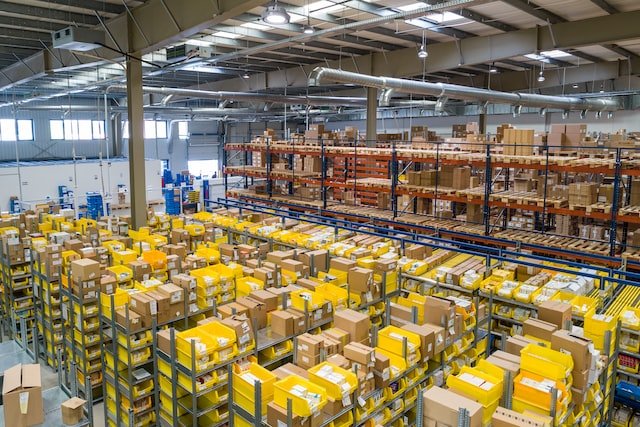Though we may have concerns around the amount of power and influence Amazon has over modern society, there’s no question that the company has also empowered many as well. Amazon has allowed buyers and sellers to connect from all over the globe, empowered many small-scale business owners and improved customer service for all.
When Amazon first started as an online bookstore in 1994, few could have imagined the colossal success it would go on to achieve. Now, with over 300 million active users, the company has been described as ‘one of the most influential economic and cultural forces in the world’, having normalised the concept of fast, free delivery.
Just last year, Amazon turned over $469 billion in net revenue. From electronics to groceries, it encompasses almost every category of retail and has expanded to include a range of digital services such as Amazon Music, Amazon Books, Amazon WMS, and Amazon Web Services. Needless to say, it is the leading force in the growth of eCommerce.
However, Amazon hasn’t reached this level of success without a fair share of criticism along the way. Like other companies of its size, Amazon has been frequently described as yet another ‘evil tech company’, known for avoiding taxes, poor worker treatment and anti-competitive behaviour that’s ‘destroying high streets in every country that it operates. in.
It has become fashionable to mention large corporations in derogatory terms but, sadly, it’s often because these negative critiques often hold some truth. In 2020, for example, Amazon’s direct taxes came to only 2.3% of its total revenue in the UK; leaked documents have shown that Amazon employees are currently quitting at twice the rate of recent years, thanks to a gruelling work culture and low pay; and between 2010 and 2020, Amazon invested over £32 billion in UK operations (i.e. infrastructure, fulfilment centres, and offices) – certainly a difficult number for small businesses to compete with.
Yet, despite these concerns, Amazon continues to grow at an exponential rate and it doesn’t look to be stopping any time soon. In fact, the pandemic led to an unprecedented rise in online shopping, which only strengthened our reliance on the company. Are we all just Prime addicts or are there some positives to Amazon that perhaps we’re quick to overlook?
Generally, we continue to support these tech companies because we struggle to resist the convenience they provide – in Amazon’s case, an endless choice of products that are easy to browse and can be delivered quickly (for Prime members, next-day or even same-day delivery) – not to mention the streaming services such as Prime Video and Music.
For myself, as a visually impared customer, Amazon has provided me independence and choice that would be unimaginable otherwise. Whilst high street shopping is often off-bounds for blind and visually impaired customers, even most online platforms are awful when it comes to accommodating this demographic. Some of my middle-class readers may be appalled to hear this, but even John Lewis is decades behind Amazon in terms of functionality and accessibility on its on-line platform.
Though we may have concerns around the amount of power and influence tech companies have over modern society, there’s no question that Amazon has also empowered many as well. Yes, we all bemoan the fact that Amazon has killed off smaller competitors and family-run bookshops from the high streets, but few of us stop to consider the number of opportunities that Amazon has also created for the ordinary person. Thanks to its established customer base and well-supported delivery services, many small-scale entrepreneurs have been able to launch and successfully grow their own online businesses, without needing a significant financial sum to get started. Today, over 50% of Amazon sales come from third-party merchants – most of whom are small family-run businesses that couldn’t have started without Amazon’s infrastructure in place.
In fact, Amazon has allowed buyers and sellers to connect from all over the globe; even those in small, remote villages can make a purchase and trust that it will be delivered to them the very next day. Yes, Amazon has allowed small business owners to connect with people from all walks of life, bridging the gap between small-town shoppers and the big cities.
Further, thanks to the product review system, customers can now make purchases with a greater sense of reassurance that they’ve made the right choice – an essential part of Amazon’s value proposition to customers. Nowadays, we take for granted the review systems that allow us to book a cab, rent a property, or find a handyman, but credit must be given to Amazon for helping to popularise this tool.
Amazon’s customer service has also led to a host of knock-on benefits outside of just eCommerce. Customer service in the UK has always been substandard, but Amazon has played a large role in raising the bar when it comes to shopping in general, not just online. Thanks to Amazon’s customer-first approach, many shop-owners have been forced to raise their own customer service options to ensure a better purchasing experience for all.
This is all to say, though there definitely are negative results that come with any company operating at such a mammoth scale, we can’t ignore the many benefits that have arisen alongside them. Shopping and selling are both easier now than they ever have been and, in many ways, we have Amazon to thank for this. The fact of the matter is, eCommerce is certainly the future of shopping and Amazon is the current leader in this trend. Contact us for more information on how to leverage Amazon to increase your sales.











